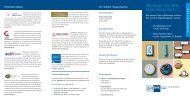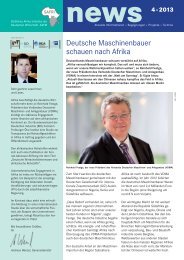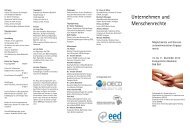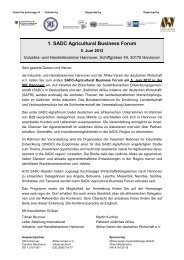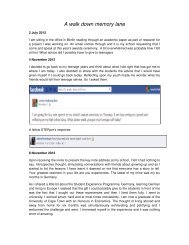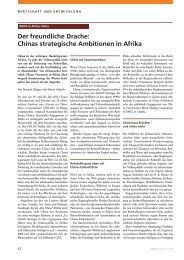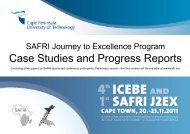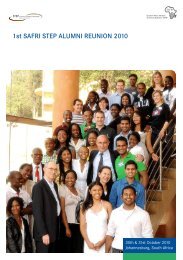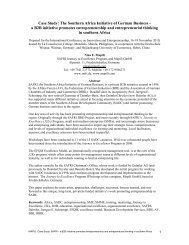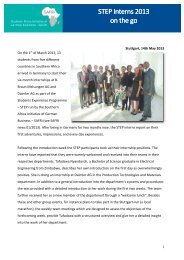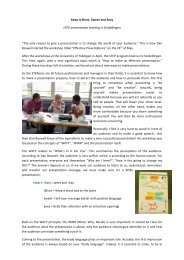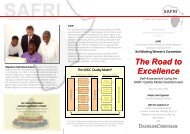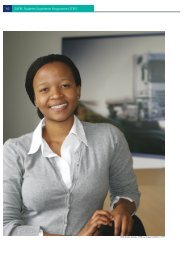conference programme - icebe.net
conference programme - icebe.net
conference programme - icebe.net
You also want an ePaper? Increase the reach of your titles
YUMPU automatically turns print PDFs into web optimized ePapers that Google loves.
Paper Abstracts—In Alphabetical Order of Presenters<br />
41<br />
CONCEPTION OF NEW INTERDISCIPLINARY COURSES –<br />
MASTER OF BUSINESS ADMINISTRATION “HEALTH CARE<br />
MANAGEMENT”<br />
ABSTRACT<br />
HEIKE KRAUSSLACH<br />
University of Applied Sciences Jena, Jena, Germany<br />
The University of Applied Sciences Jena has substantial competencies<br />
for health issues in its engineering, business and social departments.<br />
In 2010 the interdisciplinary centre of competence “Health”<br />
was founded to concentrate these competencies. Among others it<br />
deals with the challenges of an increasing rate of economy in the<br />
health sector. In addition to practical research, the centre of competence<br />
focuses on new teaching issues. One new offering is the establishment<br />
of the Master of Business Administration (MBA) “Health<br />
Care Management”, which aims to integrate education and health<br />
even more closely. It provides a factor of success to meet the mentioned<br />
needs. The target group of the MBA includes managers of<br />
public health care in medical, nursing, social, and business fields.<br />
The MBA is offered as a part-time course. A high expertise and the<br />
practical knowledge in the respective area are assured by collaborating<br />
with other universities and a university hospital. The curriculum<br />
is highly interdisciplinary and teaches issues of business and<br />
health economy as a holistic process.<br />
With the establishment of the new course the University of Applied<br />
Sciences Jena meets the current and future needs of medical institutions,<br />
especially hospitals, for economic knowledge.<br />
INNOVATIVE TEACHING USING INTEGRATED TASKS FOR AN<br />
ENGINEERING COURSE<br />
ROLITA R. LA COCK 1 AND IVAN F. MUZONDO 2<br />
1 Cape Peninsula University of Technology, Department of Civil Engineering &<br />
Surveying, Cape Town, South Africa, 2 Tshwane University of Technology,<br />
Department of Geomatics, Tshwane, South Africa.<br />
ABSTRACT<br />
This paper describes the use of innovative teaching methods in an<br />
engineering discipline by members of that profession. It is set at two<br />
University of Technologies (UoTs) that employ integrated tasks<br />
training (ITT) and evaluation through a portfolio of evidence for final<br />
assessment of the subject Engineering Surveying.<br />
The ITT join various subjects from the various engineering courses,<br />
to prepare the students for the reality of the work place, while teaching<br />
them the basic skills of life. The ITT encourages and teaches the<br />
students to develop skills, and empower them to become competent<br />
to adapt to technological changes. Institutions cannot teach all the<br />
theory in allocated timeslots, and reductions in staff numbers and<br />
resources bring in higher staff student ratios, which without innovation<br />
may compromise on quality.<br />
The paper discredits the idea of extending course hours or <strong>programme</strong><br />
years to cover all content, recommending instead that<br />
teaching concentrate on the basics, while developing the student’s<br />
skills without reducing the overall outcome quality. In the end, the<br />
engineering programs remain compliant with professional bodies’<br />
standards.



